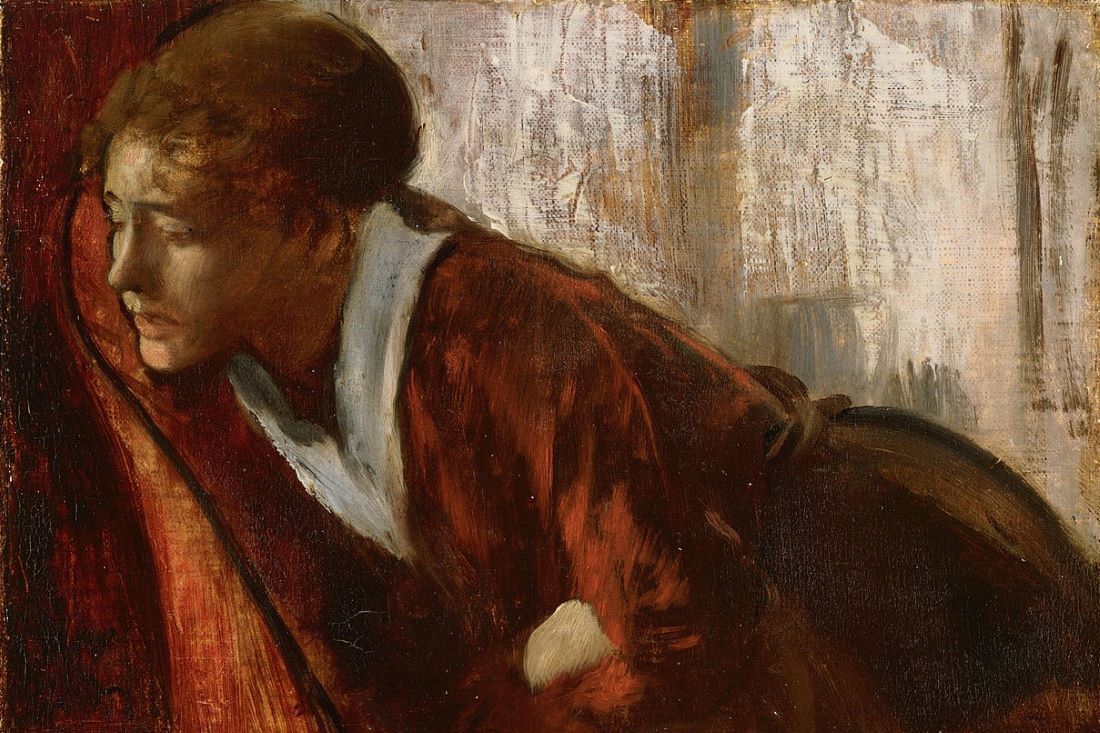Mr. Rogers, in times of national crisis, would share with his television neighbors some advice his mother had given him. It was advice for those times when the tragic or fearful encroached on his childhood life. “Look for the helpers. There are always helpers.” He shared it, for example, in a special episode for parents and children that aired after John Lennon, President Reagan, and Pope John Paul II were shot in a period of 10 months. In recent years, his mother’s words—look for the helpers—have become a meme. As COVID-19 has swept across the world, attacking the health of many and devastating the livelihood of many more, Mr. Roger’s advice has found life again on social media.
It has been attached in particular to images of medical professionals helping to care for the sick, but also to other essential workers at grocery stores, in garbage trucks, and elsewhere. In the face of something so amorphous and relatively unprecedented in our lifetime as a global pandemic, adverting to the helpers provides genuine relief. We may be alone in our homes, but we will not have to endure this danger by ourselves.
I am not the first person to point out, however, that the advice Mr. Rogers has relayed from his mother was advice offered to a child, for a child, and was repeated to an audience of children. It was meant to help a young person read the overwhelming images they encounter through the television. It directs their eyes to something determinate, to a role and a function that makes of what they see a narrative. These people are sick or hurt, these people are scared, but these people are coming to help the sick or hurt or scared.
Finding the helpers reminds us that, however bad things are, there are people there making it better, even if only a little. For a child, whose world is already often overwhelming under the best circumstances, this advice offers a path through and maybe past the potentially traumatic. No doubt there persists in each of us the childhood self, comforted by the helpers made visible, and so by our uncanny times made legible. And the example of selfless service and care that doctors, nurses, EMTs, and so many others provide right now heartens our adult selves no less.
In the wake of the terrorist attacks on September 11, 2001, Mr. Rogers came back from his recent retirement to record a series of public service announcements. I can only find two of them on YouTube anymore and so if he repeated his mother’s advice to look for the helpers then, I do not recall and cannot be sure. However, the two I can find are striking in that they address the “television neighbor” not as a child, but as an adult—and as an adult with responsibilities to the children in their life. In one of them Mr. Rogers says,
I’m just so proud of all of you who have grown up with us. And I know how tough it is some days to look with hope and confidence on the months and years ahead. But I would like to tell you what I told you when you were much younger: I like you just the way you are. And, what’s more, I’m so grateful to you for helping the children in your life to know you’ll do everything you can to keep them safe and to help them express their feelings in ways that will bring healing in many different neighborhoods. It’s such a good feeling to know that we’re lifelong friends.
In all of 45 seconds, Mr. Rogers travels with us into our moment, carrying the messages we needed as children together with the message we needed in our moment of national trauma. Our value is affirmed. He is proud of us. He likes us just the way we are, as he always has. But now, “what’s more,” Mr. Rogers is grateful because we are helping him. We are helpers. And how are we helpers?
By sharing his message with the children to whom we are parents, godparents, grandparents, aunts, uncles, teachers, priests and deacons—in a word, “neighbors.” And what is that message? That our feelings are mentionable, and because they are mentionable they are not only (as he was fond of saying) manageable, but even a source of healing. In this short television visit, Mr. Rogers expressed his confidence in us, his neighbors and friends, that we could be among the helpers that children find when they look on tragic or frightening world events.
As I said above, during this pandemic there are the usual helpers to be found, in uniforms and lab coats, and some unusually ordinary ones, in grocery-store employee t-shirts and in coveralls or reflective vests. But for most of us, with children or without, the best way to help is to do nothing, to stay put, to isolate and “socially distance.” Of course, for some this way of helping—this “nothing” that helps—initiates myriad material crises. We may have lost jobs, lost childcare, incurred bills, deferred opportunities, and so on. But for so many, whether in material crisis or not, this doing-nothing initiates a spiritual crisis.[1]
Speaking for myself, I have found my time in my home, at “social distance” posing a profound and persistent inner challenge. Understanding what is happening globally, nationally, and locally as circumstances change day to day eats up plenty of processing power on its own. Then, because the new normal is so disorienting, discerning and deciding what is best, what is safe for me and my family has been downright exhausting. How often can I go the grocery store? Can I bring my mail in my house? Am I helping or hurting workers and local businesses by ordering food? I have felt daily at sea.
The simple, basic work of establishing new routines for me, for my students, for my kids, even for my dog has swamped me. And beyond the practical stuff, there are ebbing and rising tides of feeling: sometimes despairing, sometimes panicked, sometimes grateful, sometimes ambitious. My imagination spins with the unsettled details of our health, our careers, our economy, our nation, and our world. And just beneath all of these a there swims a persistent anxiety: “Will I prove adequate to these new, strange, grinding, and fearful circumstances? Will I be enough?”
That last question suggests how plunging below all of my frantic paddling near the surface there lies the greater spiritual abyss of our pandemic moment. Despite all the advice of experts and the armies of trained professionals at the ready, only I can choose to do the “nothing” that will help. Only I can sit in and with the “nothing” that this crisis requires. It was always true that no one can be responsible for me, but the fact that being responsible in this case largely requires the cessation of action and, in many ways, a certain withdrawal from cooperation has wrapped our submarine, ontological sense of loneliness in much more obvious, much less avoidable loneliness.
At first blush, it seems strange that Mr. Rogers would have addressed our troubled hope and confidence by repeating his familiar affirmation, “I like you just the way you are.” Why would that be helpful? What was I supposed to do with that? What am I supposed to do with that? It was always his central message, borrowed from his grandfather, that we are each special and we make each day a special day and that there is no one else in the whole world just like us.
It is a message that, perhaps because it resembles so much pop-psychology, hides its profundity and its essential spiritual utility. But when we have been told that “nothing” helps, it is a message that we may find we need more than ever. When we are stuck with ourselves, with only “nothing” to bring to the aid of our suffering communities, the belief that we, just by being ourselves, are special, is irreplaceable. When “nothing” helps, we have to believe that just being ourselves is worth doing.
Though it has sometimes been mocked as either expressing or inspiring a culture of fragility and entitlement (I recall some cable news hosts taking this line a few years ago), Mr. Rogers’s televised certainty that we are special and that people can like us just the way we are is not faddish pop-psychology. It is not a televisual participation trophy. It is a crucial spiritual and psychological insight. Moreover, the truth of this insight rests on two bedrock theological principles, principles that the Rev. Dr. Fred Rogers never enunciated during his television visits, but that surely suffused his indelible Presbyterian faith. The first principle is the doctrine of Creation. The second is the Trinity.
The ultimate ground of Mr. Rogers’s affirmation of your value is the firm conviction and foundational teaching of all three Abrahamic faiths that your existence results from God’s knowing and free decision that you ought to exist. This is often called the doctrine of Creation. Christians say in the Nicene Creed that God is the maker of all things, visible and invisible, in heaven and on earth. We affirm that the Father makes everything to be through the Word, and so we may say that God’s making is not just by divine power, but also by a kind of Trinitarian rationality.
God knows with God’s perfect knowledge that your existence is worthwhile. But God does not just know your value. God acts to realize your value—which is to say, creates you—for the sake of your intrinsic worth. Moreover, the motivation for this act is God’s love for you. Let me say that again: you are loved with God’s own love. And so it is in the Holy Spirit as well, in and by the love of the Father for the Son and the Son for the Father that you are carried out of nothing (ex nihilo) into this luminous, mysterious field of being anything at all.
If, however, you are lately—like me—possessed of a dark-turned mind, and especially if that mind is given to a certain kind of logical stubbornness, you might note that you share this value, this worth, this divine-beloved-ness with all creatures. What holds for me holds for my dog and for the trees in my yard and (we should not hesitate to say) this novel coronavirus as well. This is true. But recall too that Mr. Rogers did not only affirm your worth, but also your “special-ness,” your uniqueness. “There’s no one else in the whole world just like you.” The doctrine of Creation alone cannot warrant this truth, but if we hold that teaching in one hand and the triunity of God in the other, we find Mr. Rogers’s affirmations on firmer ground.
As many theologians have noted, the great breakthrough of Nicene theology was the adaptation of the Greek philosophical notion of ousia, of being, to the question of the Son of God’s relationship to God the Father. We still pronounce a latinate translation of the Greek homousion when reciting the Creed at mass: “consubstantial with the Father.”
In the previous translation, we had what was maybe a more familiar anglicization: “of the same being as the Father.” But so that this affirmation of an infinitely and eternally shared divine being among the Father, the Son, and the Holy Spirit did not collapse the economy of salvation. It had to be accompanied by St. Athanasius’s rule: all that is said of the Father also is to be said of the Son except that the Son is the Son and not the Father (and, we may infer the same, mutatis mutandis, of the Holy Spirit).[2]
Thus, we may note with Bernard Lonergan that what have come to be known as the “personal” identities of the Father and Son and Holy Spirit are “identities in the positive sense” that each is itself, but they are also “identities in the restrictive sense with regard to one another: The Father is not the Son; the Father not the Spirit; the Son is not the Spirit.”[3]
What to make of this? In light of Mr. Rogers’s affirmation of our individual uniqueness, our personal “special-ness,” we should take note that even in the infinite and eternal God, even among persons who entirely share a single nature without division or separation or limit, the uniqueness of personal identity is not diminished. The Son is the Son and the Father is not. The Holy Spirit is the Holy Spirit and the Son is not.
Consequently, even though we share with all creatures a worth that rests in the perfect wisdom and love of God, because we are persons, because we possess what St. Athanasius called “the impress of the Word,” we are each ourselves and no one else.[4] There is no one else in the whole world just like you and there never will be. You are unique. You are special.
Every day that you spend being the unique, special person that God knows and loves, that God decides eternally should exist so long as you live, you make that day a special day. Of course, there are lots of other reasons to affirm your value and your unique special-ness. But these theological reasons are the bedrock on which all of those other reasons rest. You are like-able and lovable because it is God’s loving that causes you to be anything at all. You are irreplaceably special because you are a person on analogy with divine personhood, and even—especially!—divine personhood is irreducible.
In a time when you are asked to be one of the helpers by doing “nothing,” and in response to the immense spiritual task that “nothing” imposes, I hope you will remember Mr. Rogers’s perennial wisdom: whether you shower or do the dishes, write or exercise, get anything done or do not, you make today a special day just by being you.
No matter how many loaves of sourdough bread you see people bake on Instagram or how many clever crafts you see people do with their kids on Facebook, there is no one else in the whole world just like you and only you are you—even when doing the “nothing” that helps. So no matter how hard this is today or will be tomorrow, or how well you keep it together or do not, we know that people can like you, can love you just the way you are. And we know that because we know that God already does.
I am just so proud of you for devoting yourselves to this “nothing” that helps. I know intimately how hard it is to look with hope and confidence on the weeks and months, maybe even years, ahead. But I would like to reiterate what Mr. Rogers was telling us all along: You are making today a special day, just by being you. There is no one else who can stay at home for you, wash your hands for you because there is no one else in the whole world just like you. It is such a good feeling to have you for a neighbor. I like you just the way you are. God does too.
[1] Indeed, if Kierkegaard’s analysis of despair is to be believed, those with no shortage of comfort and distraction whose material circumstances are most benign might face the more profound spiritual crises. It is a greater depth of despair, Kierkegaard noted, to be in despair and not know it than to be all-too-aware of one’s despair, one’s angst. See Søren Kierkegaard, The Sickness Unto Death: A Christian Psychological Exposition for Upbuilding and Awakening (Princeton, NJ: PUP, 1980).
[2] Athanasius, Oratio 3 contra Arianos, 4.
[3] Bernard Lonergan, “The Origins of Christian Realism” in A Second Collection (Toronto: Toronto, 2016), 218-19.
[4] Athanasius, De incarnatione, Book 1, Ch. 3.


